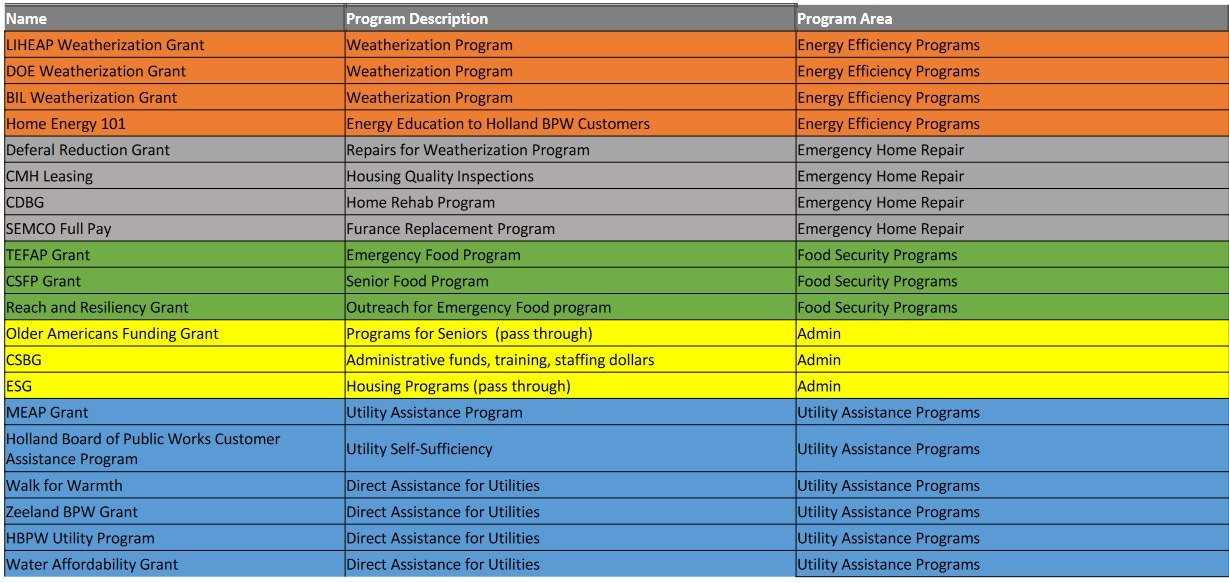The Ottawa County Community Action Agency (OCCAA), sometimes abbreviated to Community Action Agency (CAA), “aims to reduce the effects of financial hardships by promoting self-sufficiency and empowering individuals and families to achieve economic independence.” OCCAA is a county department that functions a lot like a 501C3 non-profit. It is entirely funded through grants and fundraising efforts. OCCAA’s work centers on four primary areas: utility assistance, energy efficiency, emergency home repair, and food security.
OCCAA does not directly provide services, but rather coordinates the volunteers who do. According to Program Director Jennifer Brozowski, “Although we have four buckets of work, we have so many different funding sources. With those funding sources come different rules, different guidelines.”
The eight individuals employed by OOCCA are primarily funded through the Community Services Block Grant (CSBG). The other funding sources listed above are used to provide the services of the department.
Last year OCCAA was involved in the weatherization of 34 homes which resulted in estimated 12% savings on electric bills and 17% savings on gas bills. They facilitated providing emergency repairs to two homes, and helped facilitate 677 utility bill payments. OCCAA also organized volunteers including Door Dash, to provide approximately 330-400 food boxes with coloring pages to seniors, and saw a 30% growth in the number of seniors receiving food boxes.
OCCAA primarily assists individuals considered Asset Limited Income Strained and Employed (ALISE), single parents, and individuals over 55. Once an individual receives assistance, they are requested to complete a survey which will likely be incentivized with a gift card offering in the future. Last year the eight OCCAA staff members received 1,043 hours in training which works out to about 3.25 weeks of training per person, focusing in areas such as communication, conflict, and team dynamics. In addition to training, and coordinating the activities of volunteers, staff members spend time developing strategic partnerships with other organizations, fundraising, attending community events such as the CMH health fair, partnering with graduate students for rebranding, and strengthening internal procedures.
According to Program Director Jennifer Brozowski who spoke during the March 26, 2024, Board of Commissioner meeting, (2:06:40) “Those that are coming in with a past due utility bill; we’re not just paying a bill and sending them on their way. [] we’re going to funnel them into any one of our programs that we can. Maybe their grocery bills are high; can we help with food? There might be some education that they need. There might be some weatherization services that they need. Not just within our program, but we are also referring to external partners as well, because they might not know that a particular resource exists. [] So we’re doing a lot more education, making sure they are getting connected to the right programs.”
According to the 2024 Annual Report (p. 10) OCCAA aims to help people achieve economic independence. Unfortunately, in today’s economy, it is increasingly difficult for people to be financially independent. Due to out-of-control spending at the federal level, Americans are taking on $1 trillion in new public debt every 100 days, adding to the explosive price inflation we have experienced at the grocery store and elsewhere over the past few years. When looking at the services of OCCAA, it seems weatherization which assists in lowering energy bills would indeed help people to become financially independent, but just providing handouts does not. Additionally, ensuring energy payments can be made through government assistance seems counterproductive. It makes me wonder if increasing the number of individuals on this program will lead to increasing utility rates, much the same as inefficient government intervention in the medical and education industries has caused massive price increases in those sectors. Maybe the focus should not be on providing people with handouts, but on lowering the tax rates on individuals and businesses, and reducing government regulation so that the free market economy can function properly and adjust.
Is it really the role of a government organization to be engaged work that competes with non-profits and charities?


